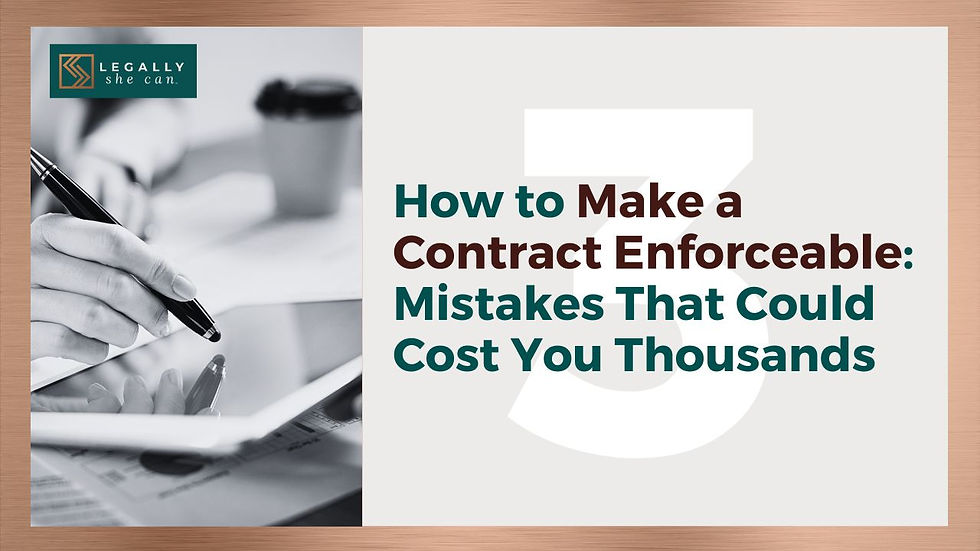How to Do a Knockout Search for Your Coaching, Consulting, or Digital Course Creation Business (A Guide in 2025)
- Dec 8, 2024
- 4 min read
Updated: Feb 25, 2025
Before launching your brand, conducting a knockout search is a crucial step to ensure your business name, logo, or tagline doesn’t conflict with existing trademarks. This guide is tailored to help coaches, consultants, and course creators navigate the process with examples relevant to service-based businesses.
Why You Need to Know How to Do a Knockout Search for Trademarks
Understanding how to do a knockout search for trademarks helps you ensure that your brand name is unique, avoiding potential legal disputes. It’s especially important for service-based entrepreneurs who rely on a strong, recognizable brand to stand out in the market. Here are the steps:
Step 1: Identify Your Trademark
Start by defining the exact trademark you want to search for. This could be a name, logo, tagline, or any other unique brand identifier you plan to use.
Examples for Service-Based Businesses:
Legally Magnetic™ for a business coaching program
Thrive Wellness for a consulting practice
Authentic Academy for a digital course platform
Step 2: Avoid Descriptive Marks
Trademarks that merely describe the product or service often fail to meet registration standards. Even if you don’t plan to register right away, avoid descriptive names to save time and legal complications.
Examples of Descriptive Marks to Avoid:
Digital Marketing Coach
Healthy Lifestyle Consultant
Leadership Academy
💡 Pro Tip: Opt for names that are unique, suggestive, or coined terms, which are more likely to pass trademark standards. For example, the brand name Burning Candle can never be allowed for products that are related to Candles but it may be allowed as a tradename for Coaching Services. Another example, The Better Coach trademark will never be granted for coaching services because it is just descriptive, but it can be granted if your service are, say medical supplies or something completely unrelated to coaching.
Step 3: Search Trademark Databases
Once you’ve chosen your mark, perform a comprehensive search to identify potential conflicts. Use multiple platforms:
Search Methods:
a. Search Engines: Look beyond page one on Google or Bing to spot similar names. b. Social Media Platforms: Check Facebook, Instagram, LinkedIn, and YouTube for accounts or pages with similar names. c. Domain Registries: Use platforms like GoDaddy or Namecheap to see if relevant domain names are available. d. Trademark Databases: Prioritize your country’s database, and then expand to international databases if needed.
Trademark Database Links:
United States: USPTO Trademark Search
United Kingdom: UK Trademark Search
Sweden: Swedish Trademark and Patent Office
Switzerland: IGE Trademark Search
European Union: EUIPO eSearch Plus
Global: WIPO Global Brand Database
💡 Example: Searching for "Authentic Coach Academy," try variations like "Authentic Coach" or "Authentic Academy" in these databases.
Step 4: Use Keyword Variations
When searching, don’t just type the exact name. Include possible variations, misspellings, and similar terms.
Example for “Authentic Coach Academy”:
AuthenticCoachAcademy
Authentic Coach
AuthenticAcademy
AuthenticCoaching
Step 5: Use Filters to Narrow Results
Most trademark databases allow you to apply filters to make your search more effective:
Class of Goods/Services: Select the class relevant to your business (e.g., education, training, or consulting).
Application Date Range: Focus on recent applications to avoid conflicts with newly registered trademarks.
Owner's Name: Search by the trademark owner’s name if applicable.
Step 6: Review Similar Trademarks
Identify trademarks that resemble yours in name, logo, or concept. Pay close attention to:
Spelling Variations: Look for minor differences (e.g., "Thrive Wellness" vs. "Thryve Wellness").
Phonetic Similarities: Names that sound the same but are spelled differently.
Conceptual Overlaps: Trademarks offering similar services, even with different names.
Step 7: Check Trademark Status
For each match, review the current status of the trademark:
Registered: Actively protected under law.
Pending: Application submitted but not yet approved.
Abandoned: No longer legally protected, but further investigation is needed.
💡 Pro Tip: Even if a match appears abandoned, consult a trademark professional to ensure there’s no hidden conflict.
Step 8: Assess Potential Conflicts
If you identify a potential match, analyze whether it’s in the same industry or covers similar services. Trademark conflicts typically arise if the marks overlap in:
Goods and Services: Check whether they offer comparable coaching, consulting, or course-related services.
Market Segments: Are they targeting the same audience?
💡 Pro Tip: In the United States, they the First Use Doctrine which means if you're the first person to use a mark, you have first claim over it even if you havn't filed a trademark. So if you are searching in the US, you also need to search outside of trademark databases, i.e. company registry. They also have the Famous Marks Doctrine, which means if a name or logo is really famous around the world, it can protected even if it is not used elsewhere.
Why This Matters for Coaches, Consultants, and Course Creators
A solid trademark search protects you from costly legal battles and branding setbacks. By ensuring your name is unique and available, you can confidently build a business that stands out in your niche.
FREE RESOURCES TO HELP YOU SUCCEED
Step 1: Start with the Free Business Checklist
Get your step-by-step guide to building a strong foundation for your coaching or consulting business.
Step 2: Watch the Free Training
Learn the five blind spots that can sabotage your success -- How to fix them, legally protect your business and gain peace of mind.
About the Author
Hi! I’m Vena Verga-Danemar, an Onlinepreneur Legal Strategist. As both a lawyer and an online business owner, I’ve helped dozens of coaches, consultants, and course creators legally start and grow their businesses using strategies that don’t require working 24/7.













Comments